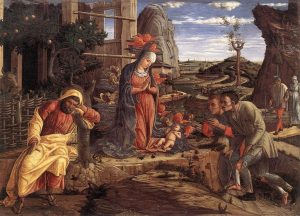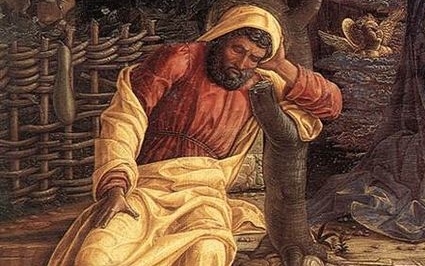There is an aspect to the nativity narratives in the Gospels of Matthew and Luke that I have been thinking about lately: the repeated failure of the main characters in the story to communicate with one another. Again and again in the nativity narratives communication somehow breaks down. The old priest Zechariah is the most glaring example. When Zechariah entered the Temple and was approached by God’s heavenly messenger, Zechariah was not able to receive the good news Gabriel announced to him (Luke 1:8-20).[1] Incredulity got in the way of proper communication. Right in the opening scene of Luke’s Gospel communication between God and man breaks down.
This breakdown in communication with Zechariah had further consequences. Unable to successfully communicate with God, the priest also found himself unable to communicate with the worshippers who had come up to the Temple to pray (Luke 1:21-22). Zechariah was unable to hear and unable to speak, unable to make himself understood because he had been unable to listen. By making signs the old priest only managed to convey to the worshippers the vague idea that he had seen some sort of vision in the Temple.
But poor old Zechariah was not the only character in the nativity narratives who had difficulty with communication. His wife Elizabeth, although she was able to speak, seemed unable to share with her friends the good news that God had opened her womb and that she was finally going to have a baby (Luke 1:24). Instead of sharing her joy Elizabeth bottled it up inside.

Andrea Mantegna, “The Adoration of the Shepherds” (c. 1450). Image courtesy of Wikimedia Commons.
I think we can also detect a breakdown in communication between Joseph and Mary. Scripture never tells us exactly what happened between them, and there are many songs and folk tales about Mary’s attempt to explain her pregnancy to Joseph and his unwillingness to believe Mary’s fantastic story. But I am not sure it happened like that. Scripture seems to suggest that Joseph discovered on his own, without Mary telling him, that she was pregnant. Luke implies that as soon as Mary knew she was pregnant she ran away to her cousin Elizabeth without saying a word to Joseph. Somehow Mary just could not bring herself to tell him. And it does not seem as though Joseph discussed the matter with Mary either. Matthew’s Gospel says: Because Joseph her husband was a righteous man and did not want to expose her to public disgrace, he had in mind to divorce her quietly (Matt. 1:19; NIV). The words had in mind seem to suggest that Joseph had not spoken of his plans with Mary. It was only by an intervention from Heaven that the matter was explained and Joseph and Mary were reconciled (Matt. 1:20-25).
There is one more point. Scripture goes out of its way to emphasize that Joseph was a righteous man (Matt. 1:19). Gabriel tells us straight out that Mary was highly favored and that the LORD was with her (Luke 1:28). Luke tells us that Zechariah and Elizabeth were upright in the sight of God and that they kept all of the LORD’s commandments blamelessly (Luke 1:6). Despite their being good people, despite their best efforts to honor God by doing the right thing, communications nevertheless broke down. That is a mystery, but for me it is also a comfort.
I find the failures of communication in the nativity narratives to be comforting because as a married man, as a preacher, and as a human being I have experienced failure in communication even when I was trying my hardest. In my married life I have often found myself putting up walls of resistance and contriving arguments and explanations when what my wife really needed was reassurance that I was hearing her. At other times I have found myself growling and grumbling about my troubles when what I ought to have been focusing on was the gratitude I have for the many things my wife does for me every day that make my life worth living.[2]
In my efforts at preaching I used to get so frustrated because I could not seem to get out in words the message I had in my heart. I did not seem to be able to inspire the wonder and excitement I was experiencing as I studied Jesus’ message. Somehow the space between the pulpit and the pews seemed to swallow up the good things I wanted to share with my congregation. So often I was shocked to discover that the good things I had to share were perceived as threatening and disturbing. I used to be so disappointed at my inability to bring other people along with me on my journeys into the Scriptures.
And on a more basic human level, I know that I often fail to say the important things and fill up the space with trivialities instead. How often do I say “Thank you” or “I love you,” “I’m sorry” and “I forgive you” to the people who need to hear those words? And when I try, why is it that it seldom comes out the way I wanted?
And so, because I find these shortcomings in myself, I find the similar failures of the characters in the nativity narratives to listen and to make themselves understood to be comforting. Zechariah and Elizabeth, Joseph and Mary are people who faced the same difficulties and who struggled with the same problems I do. And yet, despite their failures, God used these people to bring Jesus into the world. Mary and Joseph and Elizabeth and Zechariah are woven into the story and into the family of Jesus. They became a part of him as he became a part of them. God’s favor and goodwill toward humankind overcame their weaknesses.
The story of Jesus’ birth begins with scrambled communications, but that is not where the story ends. The story ends with Mary trusting Joseph and with Joseph caring for Mary. The story ends with Zechariah speaking up for his wife Elizabeth and using his newfound voice to praise the living God. The story ends with the shepherds rejoicing at the good news they have believed. The story ends with the angels of heaven praising the LORD for what he accomplished through the cooperation of Zechariah and Elizabeth and Joseph and Mary. In the course of the story, God works through imperfect people to give them the perfect gift of the Messiah. This gives me hope that as I do my best to share Jesus’ story and his message, God will not allow my failures to stand in the way of his great mission to redeem Israel, humankind and the whole of his creation.
- [1] To learn more about Zechariah, see Shmuel Safrai, “A Priest of the Division of Abijah”; idem, “Zechariah’s Prestigious Task”; and idem, “Naming John the Baptist.” ↩
- [2] By the way, I would like to thank my wife, Lauren Asperschlager, for proofreading this meditation. ↩
































































































Comments 1
Read your article with fascination and tears. For me the ‘take home’ is summarized in your statement “….God works through imperfect people to give them the perfect gift of the Messiah. This gives me hope…” Thank you.